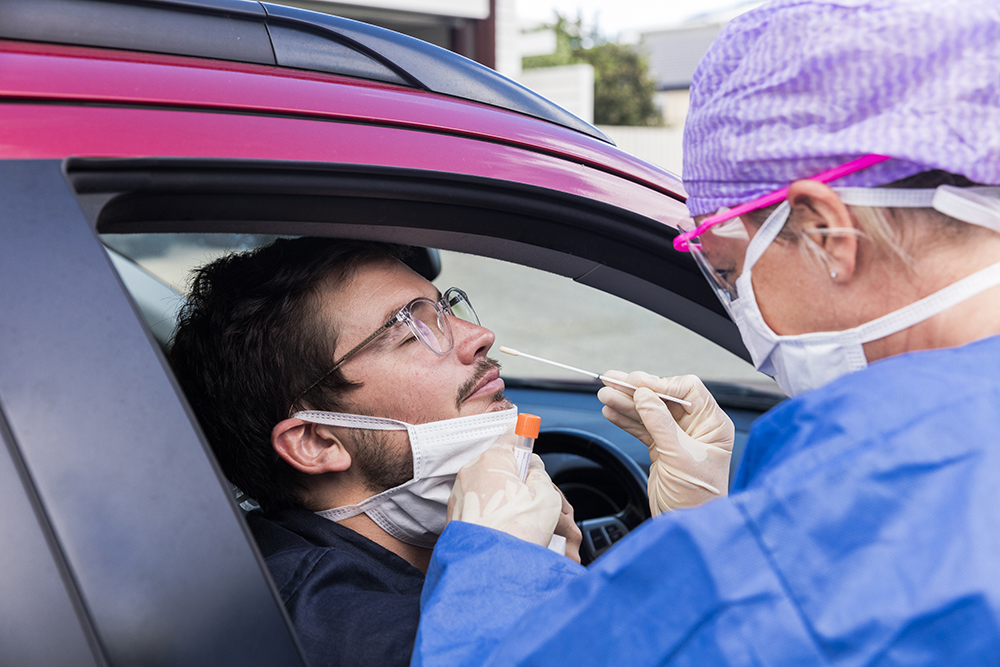
COVID-19 cases surge as provinces re-impose restrictions
December 20, 2021
By
The Canadian Press

COVID-19 has reared its head across Canada ahead of the 2021 holiday season. (Zstock/Adobe Stock)
Large parts of Canada are starting to hunker down, with new restrictions coming into effect as a fifth wave of COVID-19 fuelled by the Omicron variant saw thousands of new cases across the country over the weekend.
Quebec and Nova Scotia set new records for their daily case counts on Sunday while Ontario reported more than 4,100 additional infections, which was 800 more than the previous day.
Other parts of the country were also experiencing a surge in new cases unseen since before the summer as the Omicron variant, identified by the World Health Organization as a potential concern only last month, became increasingly entrenched in Canada.
And while hospitalizations have remained steady in Ontario and some other parts of the country, a recent spike in the number of severe cases in Quebec has added to concerns the rest of the country could soon follow.
In response to the growing wave, several provinces have started to re-impose public health restrictions only days before the start of the holiday season that in many cases apply to both the vaccinated and unvaccinated.
In Ontario, new limits on social gatherings and capacity limits in stores and restaurants came into effect Sunday as the provincial government struggled to get escalating case counts under control.
Similar restrictions were set to come down in British Columbia and Quebec on Monday.
Quebec reported 3,846 new cases on Sunday, setting an all-time high for the province’s daily tally for the second time in three days, while the number of hospitalizations and people in intensive care because of COVID-19 continued to increase.
Dr. Adalsteinn Brown, head of the Ontario COVID-19 Science Table, had warned Thursday that while hospitalizations in his province had remained fairly steady, he expected a spike in two to three weeks.
“It does cause serious disease,” Brown said of Omicron while discussing the science table’s latest modelling. “Hospital rates have risen in South Africa where it first took hold. It’s not just a case of the sniffles.”
A Quebec government health-care research institute also said Thursday that it expects more than 700 non-ICU hospitalizations in the province, and more than 160 people in intensive care, within two to three weeks.
However, the institute said it was less confident than usual in its projections because its data on the Omicron variant was based on a single study conducted in South Africa, which has a significantly lower vaccination rate than Quebec.
Meanwhile, Nova Scotia, which imposed new restrictions starting Friday, also reported a new daily record of new infections on Sunday with 476 cases. New Brunswick said it had 108 new cases and Newfoundland and Labrador reported 61 cases.
Newfoundland and Labrador’s chief medical officer of health, Dr. Janice Fitzgerald, said there were 127 active reported cases of COVID-19 in the province, though nobody is in hospital due to the virus.
Education Minister Tom Osborne nonetheless said schools would close for the holiday break beginning Tuesday rather than Thursday and students are to prepare for possible online learning when classes resume on Jan. 4.
N.L. Premier Andrew Furey said everyone has seen the spread of Omicron in other parts of the country and wants to avoid the same situation in his province.
“The spectre of a surge is on our doorstep and we need to address it now before we suffer the same fate. I know it couldn’t come at a worse time,” he said.
In Northwest Territories, officials confirmed the arrival of the Omicron variant.
A statement on the territories website doesn’t say where or how many cases were detected, but it includes an update to a public exposure notification that it says is “to align with Omicron’s higher risk of transmissibility.”
The update warns certain passengers on a WestJet flight from Kelowna, B.C. to Calgary on Dec. 13, as well as a flight on the same airline later that day from Calgary to Yellowknife, must isolate regardless of their vaccination status.
The sudden onset of a fifth wave of COVID-19 has pushed testing capacities in many parts of the country to the limit, with long waits for tests and public health officials warning people with symptoms to self-isolate even if they haven’t been tested.
Ottawa Public Health on Friday sent a letter to health-care professionals warning about a lack of capacity, according to CTV.
“Because of this unfortunate reality, OPH will be directing people with any symptoms of COVID-19 who are unable to access a timely COVID-19 test to assume that they are infected with Omicron and self-isolate immediately for 10 days from symptom-onset,” the letter read.
“Their household contacts, regardless of vaccination status, will also be directed to isolate.”
Michelle Hoad, chief executive officer of the Medical Laboratory Professionals’ Association of Ontario, said a pre-existing shortage of technicians combined with the sudden explosion of new cases and tests due to Omicron has pushed already overtaxed labs to the limit.
“The sudden surge in testing now is showing all the cracks in our system,” Hoad said. “And it is not just a problem in Ontario, it’s across the entire country. So this shortage of medical lab technologist is a problem in every single province and territory.”
The fifth wave has also sparked a rush for booster shots as the Omicron variant has caused a surge of infections among both vaccinated and unvaccinated Canadians.
Ontario’s science advisers have said two doses of COVID-19 vaccine are only 35 per cent effective against the variant three months after being administered, while a third dose bumps efficacy up to 75 per cent.
The province on Monday will open booster eligibility to all residents aged 18 or over who received their second dose at least three months ago. Other provinces are also expanding their booster campaigns to protect against Omicron.